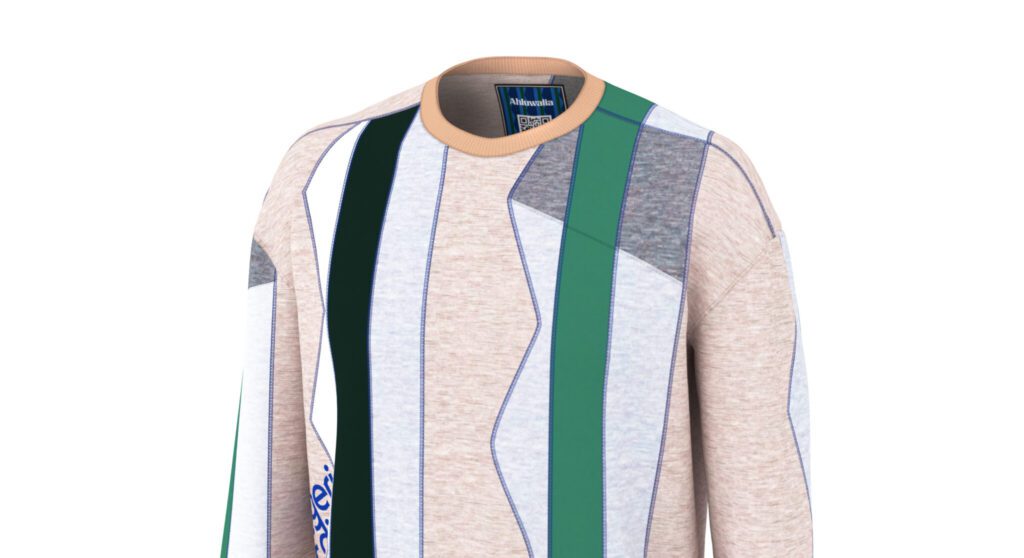ENABLING CIRCULAR SYSTEMS?
Designer challenge: Priya Ahluwalia

Designer challenge: Priya Ahluwalia

For CFS+ Avery Dennison have partnered with Ahluwalia, a pioneering fashion brand renowned for a design-led approach to sustainability, to demonstrate the opportunities to enable circular systems through digital labelling solutions.
Through her namesake, emerging brand, Ahluwalia, Priya references elements from her dual Indian-Nigerian heritage and London roots to explore the life of vintage and dead stock clothing, using textile techniques to give them new life. Ahluwalia has already amassed an enviable list of accolades, including the LVMH Prize (2020), Forbes 30 under 30 European Arts and Culture List (2020), and the H&M Design Award (2019).
“I think creativity and ingenuity are invariably linked to progression in technology. Technology has been vital to changing the fashion industry. Whether that is through material sciences or pattern cutting programmes, these advancements improve efficiency and reduce waste. None would be possible without creativity and ingenuity.”
In collaboration with Avery Dennison, for their SS21 collection, Ahluwalia have designed a bespoke label, which once digitally activated has the power to tell the past, present and future story of the garment. If we can understand the past, we can unlock the present, and connect the future of our garments to their past. Find out more about how Avery Dennison partnered with Ahluwalia to enable circularity for their SS21 collection by watching the trailer below.
For too long the apparel industries have functioned with a linear TAKE-MAKE-DISCARD model. The planet can no longer sustain this level of extraction and overconsumption.
A circular model aims to redesign this system – reducing energy use, maximising resources, extending the life of our products, and designing out waste.The goal is to keep products, and everything that went into making them, looping through circular systems.
For apparel to become ‘circular’ it must travel through a complex and fragmented supply chain – manufacturing, distribution, retail, recycling. To achieve this requires the design of products and businesses to be radically transparent and connected.
How we view and design products, not as static objects but as dynamic and evolving systems, is key to a more sustainable future. Every garment has the potential to be circular. It just has to be connected.
The unassuming label inside every garment has the potential to transform how we source, design, manufacture and enjoy products while moving the apparel industry towards circularity.
When digitally activated, a label can be used to add connectivity to any physical item – enabling brands to track products from creation, through use and into their next life, capturing and recording vital data along the journey, while connecting the dots between complex systems.
Leading brands and designers are increasingly experimenting with novel approaches and innovations. Today, 3D printing is often used for exclusively prototyping, but Zellerfeld believes this technology is ready to be scaled for production.
This will not only result in designers bringing bolder designs to market, but it will also open up new markets and opportunities that have not been addressable before – for example, by printing custom-fitted and recyclable shoes locally, which can help transform the industry to become more efficient and sustainable.
Avery Dennison is a global leader in physical and digital labelling solutions. We task ourselves with the invention of products that serve the evolving needs of consumers, while reducing our own environmental impact, advancing the circular economy and being a force for good in the communities where we operate.
We recognise there’s a clear role for technology in bringing about solutions. With an eight-decade history of materials innovation, over 15 years of pioneering development in RFID and digital ID technology, and the ability to globally support customers across many industries, we are uniquely qualified to partner with the most ambitious brands.
Together we can advance a more circular apparel industry and reduce the industry’s environmental impact. Find out more about how we can help you work toward circularity at our microsite.